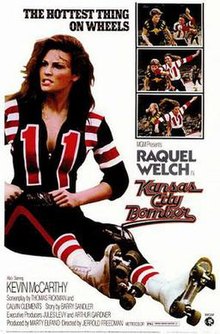Kansas City Bomber
| Kansas City Bomber | |
|---|---|
 Promotional film poster | |
| Directed by | Jerrold Freedman |
| Written by | Calvin Clements Sr. (writer) Thomas Rickman (writer) Barry Sandler (story) |
| Produced by | Martin Elfand (producer) Arthur Gardner (executive producer) Jules V. Levy (executive producer) |
| Starring | Raquel Welch Kevin McCarthy Helena Kallianiotes |
| Cinematography | Fred J. Koenekamp |
| Edited by | David Berlatsky |
| Music by | Don Ellis |
| Distributed by | Metro-Goldwyn-Mayer |
Release date | August 2, 1972 |
Running time | 99 minutes |
| Country | United States |
| Language | English |
Kansas City Bomber is a 1972 American drama film released by Metro-Goldwyn-Mayer, directed by Jerrold Freedman and starring Raquel Welch.
Plot
The film is an inside look at the world of Roller Derby, then a popular league sport.
The story focuses on K.C. Carr (Welch) who has just left her former team in Kansas City, Missouri to start her life as a single mother over again in Portland, Oregon with a team called the Portland Loggers. Loggers' owner Burt Henry (McCarthy) is clearly interested in her, and K.C. and Burt date. But Burt has a rather ruthless side to him: he trades away K.C.'s best friend on the team, and when he sees that star male skater "Horrible" Hank Hopkins is interested in her, he manipulates the audience into booing Hopkins, causing him to go crazy and lose his job. Henry's endgame is to set up a match race between K.C. and her teammate and rival Jackie Burdette (Kallianiotes), with K.C. deliberately losing so that she can join Henry at a new team he's setting up in Chicago. But K.C. doesn't trust Henry anymore (or his promises to let her bring her daughter along) and wins the match race.
Cast
- Raquel Welch as K.C. Carr
- Kevin McCarthy as Burt Henry
- Helena Kallianiotes as Jackie Burdette
- Norman Alden as Horrible Hank Hopkins
- Jeanne Cooper as Trainer Vivien
- Richard Lane as TV Spokesman Jen
- Jodie Foster as Rita
- Shelly Novack as Ben
- Russ Marin as Dick Wicks
Soundtrack
The songwriter Phil Ochs wrote a song with the same title that he had intended as title song for the film, but was rejected by Metro-Goldwyn-Mayer. Ochs had A&M Records issue the song as a single anyway, and hoped to publicly debut the song at the Los Angeles Thunderbirds' track during a Roller Games television taping at Los Angeles' Olympic Auditorium, as many of the Thunderbirds skaters had appeared in the movie as extras and announcer Dick Lane had a small speaking role; Thunderbirds owner Bill Griffiths Sr. rejected that idea as well.[1] Don Ellis contributed the score of the film.
Awards and honors
Helena Kallianiotes was nominated for a Golden Globe for "Best Supporting Actress – Motion Picture"
See also
References
- ^ Schumacher, Michael (1996). There But for Fortune: The Life of Phil Ochs. New York: Hyperion. pp. 263–264, 269, 271. ISBN 0-7868-6084-7.
External links
